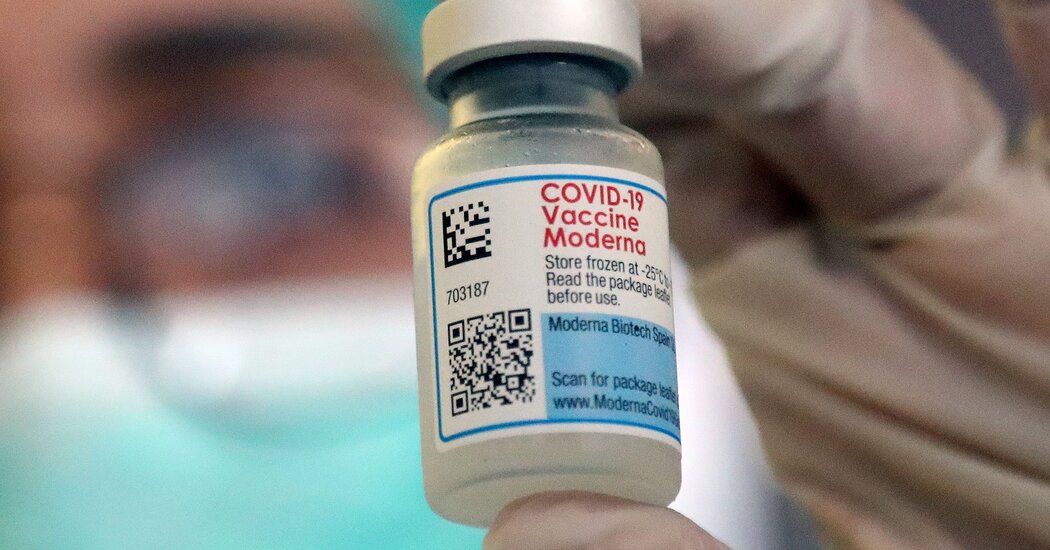
The vaccine manufacturer Moderna sued Pfizer and BioNTech on Friday, claiming that its rivals’ Covid-19 shot violates its patents protecting its groundbreaking technology.
Moderna said in a statement that Pfizer and BioNTech infringed on patents filed between 2010 and 2016 that covered its mRNA technology. Moderna, which is based in Cambridge, Mass., sued in U.S. District Court in Massachusetts and the Regional Court of Düsseldorf in Germany, where BioNTech is based.
Christopher Ridley, a spokesman for Moderna, said the company did not have an estimate for the amount of damages it was seeking.
Pfizer and its development partner BioNTech were “surprised by the litigation,” said Jerica Pitts, a spokeswoman for Pfizer. She added that the companies “remain confident in our intellectual property supporting the Pfizer/BioNTech vaccine and will vigorously defend against the allegations of the lawsuit.”
Messenger RNA, or mRNA, is the genetic script that carries DNA instructions to each cell’s protein-making machinery and has been used in the production of coronavirus vaccines.
Read More on the Coronavirus Pandemic
“We are filing these lawsuits to protect the innovative mRNA technology platform that we pioneered, invested billions of dollars in creating, and patented during the decade preceding the Covid-19 pandemic,” said Stéphane Bancel, Moderna’s chief executive. “This foundational platform, which we began building in 2010, along with our patented work on coronaviruses in 2015 and 2016, enabled us to produce a safe and highly effective Covid-19 vaccine in record time after the pandemic struck.”
Moderna, which received close to $10 billion in taxpayer funding to develop the vaccine, test it and provide doses to the federal government, had said in fall 2020 that it would not enforce its Covid-related patents while the pandemic continued. But on March 7, the company said that said that it was updating its pledge, since vaccine supply was no longer an issue outside the poorest countries. It said it expected manufacturers outside the 92 poorest countries to respect the company’s intellectual property. At the time, it also said that it was expanding its patent pledge to never enforce Covid patents for 92 low- and middle-income countries.
Moderna said on Friday that it was not seeking damages for activities before March 8 and that none of the patents relate to intellectual property generated during Moderna’s collaboration with the National Institutes of Health on Covid-19, which it said began only after patented technologies were proven successful in 2015 and 2016.
Moderna said that Pfizer copied two features of its patented technology. First, Pfizer took four vaccine candidates into clinical testing, but ultimately proceeded with a vaccine with the same mRNA technology as the Moderna vaccine. Moderna said it was the first company to validate this technology in human trials in 2015, and that neither Pfizer nor BioNTech had its level of experience in developing mRNA vaccines for infectious diseases.
Second, Moderna claims that Pfizer and BioNTech copied its full-length spike protein formulation for a coronavirus, which Moderna had created years before Covid-19 emerged. Coronaviruses refer to a large family of viruses that cause mild to moderate upper respiratory tract illnesses, according to the N.I.H. The more serious ones include SARS, MERS and Covid-19.
Moderna said it was not seeking to remove Pfizer and BioNTech’s vaccines from the market, and was not asking for an injunction to prevent their future sale, given the need for access to coronavirus vaccines.
Both Pfizer and Moderna this week finalized their submissions to the Food and Drug Administration seeking emergency authorization of retooled shots aimed at subvariants of Omicron that are causing most new virus cases in the United States. The federal government has ordered 105 million doses of Pfizer’s retooled shot.
Noah Weiland contributed reporting.
